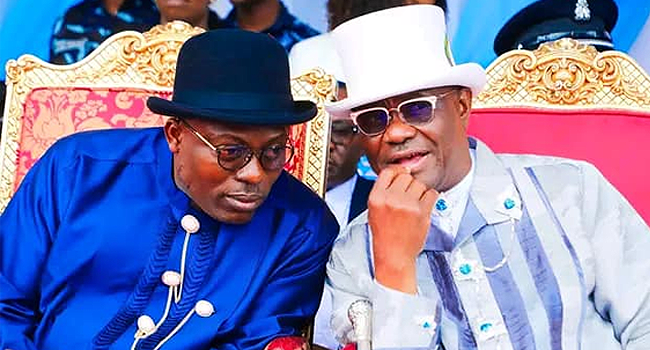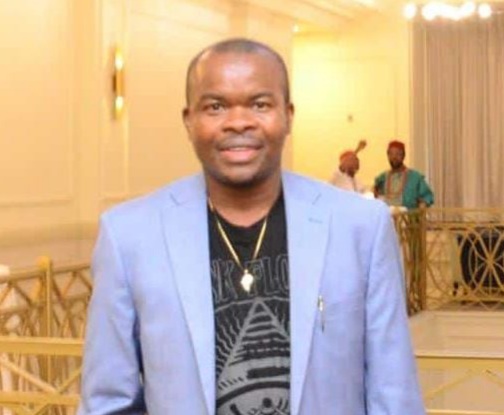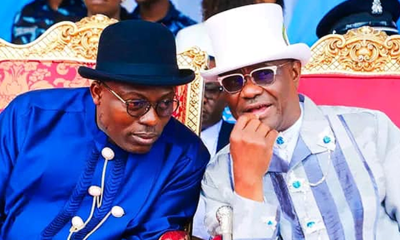Opinion
Gwo Gwo Gwon Gwo: A Dance Of Deception

This dance has been trending for days. At every nook and crannies of the social media platforms, the dance steps are very prominent. Everyone wants to dance that dance of twisting of waist and raising of one leg. Turning thereafter to pursue themselves in a very comical manner.
I have sat down to look at the sense in the dance as popularised by Brain Jotter, all I could see was a gregarious instinct of the masses and the craves to join the bandwagon.
What is ‘Gwo Gwo Ngwo’? ‘Gwo Gwo ngwo’ was just the last part of the lyrics that is filled with rich meaning and moral lessons. Tired of the hullabaloo of the ‘Gwo Gwo ngwo’ challenge, I took time to listen to the lyrics from the beginning to the end.
Gentleman, Mike Ejeagha is indeed a maestro, who knows his onus with a dexterity and sagacity that are legendary. I wouldn’t know what he had in mind telling such a story, as irredescent as that story is, it shone to my mind with a lesson that made me shed tears.
Listen to the story line. There was a bet from a King that anybody that brings an elephant to Him would marry the King’ Daughter. Bringing the elephant was no mean feat. This made other animals shy away and saw the demand as a tall order. The tortoise in its crafty and deceptive nature went and told elephant lies. Lies were too pleasant, the elephant could not but fall for it.
What was the lie? That King wants to make the elephant the chairman of its Ofala celebration. Ofala celebration is an elaborate celebration of festivity. It sounded too prestigious an offer to be the chair-man of such a festival.
On the appointed day, the tortoise went to the elephant. The elephant got ready and they set out on the journey. At a point the elephant got angry over the tortoise snail paced movement and feared they would miss the festival. So when the tortoise requested that it sat on the Elephant back to facilitate their movement, the elephant didn’t hesitate.
While on the elephant’s back, it requested the Elephant to allow it tie rope around its neck for stabil-ity. The elephant allowed it, being too obsessed to be the chairman of the Ofala, anything that would be an obstacle to it must be dealt with.
As they got close to the king’ Palace, the Tortoise raised his voice and sang: Nnam eze akpatam enyi, Nnam eze akpatam enyi.
( My King I have brought the Elephant) Nwa mbe isi na ikpata onye, Nwa mbe isi na ikpata onye. ( Small Tortoise who do you said you have brought? The Elephant queried) Asim ana ya chebe enyi dube enyi, odikam si na akpatam enyi. ( I said let the earth protect and guide the Elephant. Did I say I have brought Elephant?) Asim ana ya chebe enyi dube enyi, odikam si na akpatam enyi.
( I said let the earth protect and guide the Elephant. Did I said I have brought Elephant?) Okwa enyi ga abu isi oche, okwa enyi ga abu isi oche. (It is not the Elephant that will be the chairman?) Enyi na aga ayi so gi na azu gwo gwo gwo ngwo ( Elephant continue to go we are behind you, gwo gwo gwo ngwo) What do you make out of this story? So many? For me, it is a reflection of the deception, the Nigerian poor masses experience in the hands of our tricky political class.
The elephant represents the poor masses and the tortoise, the political class that comes with all man-ner of deception, tricks and manipulation. They come to us, the poor masses like the tortoise came to the elephant every election year with hopeless hope, fake promises, manipulative tendencies, while leading us to places of doom, destruction, hardship, shame and economic slavery as we dance ‘gwo gwo gwo ngwo’ not knowing we are being led to our destruction pools and points.
By size just as the elephant is 30 times bigger than the tortoise, so are the masses bigger than the polit-ical class. Same way tortoise deceived the elephant, the political class has been deceiving us. Shame! ‘Gwo Gwo ngwo’ as we sheepishly meet our Waterloo.
May God help us to realize our might and power over the minion political class of deceptive intents and use it to liberate ourselves from their claws of manipulations and slavery. Until we rise above their lies and deception, the same way the elephant was tied at the King’s Palace for shame and ridicule, same way we would continue under their suppression and subjugation. The ball is on our court!!
Analysis
Why Always Rivers State? By Alabidun Shuaib AbdulRahman

Why Always Rivers State? By Alabidun Shuaib AbdulRahman
Why is it always Rivers State? The question no longer sounds rhetorical. It has become a recurring reflection whenever Nigeria’s democracy appears strained, its institutions weakened, or its constitutional boundaries tested. Since the return to civil rule in 1999, Rivers State has repeatedly found itself at the centre of political crises that transcend ordinary electoral competition. What distinguishes Rivers is not merely the frequency of conflict, but the intensity, longevity and national implications of those crises. From succession battles to legislative breakdowns and federal intervention, the state has functioned as a pressure point where the contradictions of Nigerian democracy are most vividly exposed.
Rivers State’s peculiar trajectory cannot be understood without acknowledging its strategic importance within Nigeria’s political economy. As one of the core oil-producing states in the Niger Delta, Rivers hosts major petroleum assets that are critical to national revenue generation. Control of the state government therefore carries implications that extend far beyond its borders. Political office in Rivers confers access to enormous fiscal allocations, discretionary power over contracts and appointments, and leverage within national party structures. In a political system where state power is often personalised and monetised, such advantages raise the stakes of political competition to extraordinary levels.
From the onset of the Fourth Republic, these dynamics shaped the character of politics in Rivers. Peter Odili’s administration, which ran from 1999 to 2007, coincided with Nigeria’s democratic reawakening after prolonged military rule. His government helped stabilise civilian authority in the state and strengthened the Peoples Democratic Party’s dominance. Yet it also entrenched a culture of elite patronage that blurred the line between party loyalty and state ownership. Power became concentrated around the executive, while institutions that should have acted as counterweights remained weak. By the time Odili left office, Rivers politics had developed a reputation for fierce internal rivalry masked by outward party unity.
The crisis surrounding the 2007 governorship election revealed the fragility beneath that surface. Celestine Omehia’s short-lived tenure, terminated by a Supreme Court judgment that installed Chibuike Rotimi Amaechi on 25 October 2007, underscored how political outcomes in Rivers were increasingly determined by judicial intervention and party machinations rather than popular participation. While the court’s ruling was constitutionally grounded, it reinforced public perceptions that voters were peripheral actors in a system dominated by elite bargaining.
Amaechi’s eight years in office were among the most turbulent in the state’s history. Initially a key figure within the PDP, he later became a leading opposition voice against the party’s national leadership, particularly during the administration of President Goodluck Jonathan. His defection to the All Progressives Congress ahead of the 2015 elections transformed Rivers into a frontline state in Nigeria’s emerging two-party contest. Elections during this period were marked by violence, legal disputes and allegations of widespread irregularities. Rather than strengthening democratic norms, political competition in Rivers became increasingly militarised and litigious.
The ascension of Nyesom Wike to the governorship in 2015 represented both continuity and escalation. A former ally of Amaechi who became his fiercest rival, Wike governed with an assertive style that left little room for dissent. His administration pursued ambitious infrastructure projects and positioned Rivers as a visible development hub in the South-South. However, these achievements existed alongside an aggressive consolidation of political control. Party structures, legislative independence and local government autonomy were subordinated to the governor’s authority. Politics in Rivers became highly personalised, with loyalty to the executive serving as the principal currency of survival.
By the end of his second term in 2023, Wike had transcended state politics. His influence within the PDP and later his alignment with President Bola Tinubu elevated him into the national power equation. This context made the question of succession in Rivers unusually consequential. The emergence of Siminalayi Fubara as governor following the March 2023 election was widely interpreted as an extension of Wike’s political will. Fubara’s victory, secured with over 300,000 votes, appeared to confirm the durability of that arrangement.
Yet, Rivers’ history suggested that such successions are rarely seamless. Within months of assuming office, Fubara’s relationship with his predecessor deteriorated sharply. Disagreements over appointments, control of party structures and the autonomy of the executive quickly escalated. By October 2023, the conflict had spilled into the open, culminating in the burning of the Rivers State House of Assembly complex on 29 October. The symbolism of that event was unmistakable: the physical destruction of the legislature mirrored the collapse of constitutional order in the state.
What followed was an unprecedented institutional crisis. The Rivers State House of Assembly split into rival factions, each claiming legitimacy and producing contradictory resolutions. Impeachment proceedings were initiated and countered. Court orders multiplied, often conflicting, while governance ground to a halt. For months, Rivers effectively operated without a coherent legislative authority. This paralysis was not rooted in ideological disagreement or policy failure but in a struggle over political supremacy between a sitting governor and a former one determined to retain influence.
The depth of the crisis prompted federal intervention. On 18 March 2025, President Bola Tinubu declared a state of emergency in Rivers State, suspending the governor, his deputy and the entire House of Assembly for six months and appointing a sole administrator. The federal government cited political paralysis and threats to oil infrastructure, including incidents of pipeline vandalism, as justification. The National Assembly endorsed the proclamation, giving it legal force despite intense public debate.
This intervention marked a watershed moment in Nigeria’s post-1999 constitutional practice. Unlike previous emergency declarations, particularly the 2013 emergency in the northeast, the Rivers action involved the suspension of elected officials. Legal scholars and civil society organisations questioned its constitutional basis, noting that the 1999 Constitution outlines specific procedures for removing governors and legislators. The episode exposed unresolved ambiguities within Nigeria’s federal system and demonstrated how state-level political breakdowns can invite sweeping federal responses.
When the emergency rule was lifted in September 2025 and the suspended officials reinstated, Rivers returned to civilian governance, but the episode left enduring scars. Institutional credibility had been damaged, public confidence weakened and constitutional norms tested. The crisis projected the extent to which Rivers’ political instability had moved beyond internal party disputes to become a national concern.
The persistence of crisis in Rivers is not coincidental. It reflects structural weaknesses embedded within Nigeria’s democratic framework. The concentration of economic resources elevates political competition into a zero-sum contest. Godfatherism distorts succession, turning governance into a continuation of private power struggles. Political parties function less as democratic platforms and more as instruments of elite control. Legislatures and courts, rather than serving as independent arbiters, are drawn into factional battles. In such an environment, stability becomes fragile and crisis recurrent.
The consequences for governance are profound. Political paralysis disrupts budgetary processes, delays development projects and diverts attention from pressing social challenges. Despite its wealth, Rivers continues to struggle with unemployment, environmental degradation and infrastructural gaps. Citizens bear the cost of elite conflict through weakened service delivery and diminished trust in democratic institutions.
Why, then, does it always seem to be Rivers State? Because Rivers has become a concentrated expression of Nigeria’s unresolved democratic contradictions. It is a state where economic abundance coexists with institutional fragility, where political power is personalised, and where succession is treated as conquest rather than continuity. Until these underlying conditions change, Rivers will continue to oscillate between governance and crisis.
The lesson Rivers offers Nigeria is sobering. Democracy cannot be sustained by elections alone. Without strong institutions, internal party democracy and a political culture that respects constitutional boundaries, electoral victories become triggers for conflict rather than mandates for governance. Rivers State stands as a reminder that when politics is reduced to personal dominance, instability becomes inevitable. Until the structures that reward godfatherism and weaken institutions are dismantled, the question will persist, echoing across election cycles and administrations: why is it always Rivers State?
Analysis
Abroad and the Mirage of Greener Pastures, by Alabidun Shuaib AbdulRahman

Abroad and the Mirage of Greener Pastures, by Alabidun Shuaib AbdulRahman
For many Nigerians, the idea of leaving the country in search of greener pastures has evolved from a personal aspiration into a collective obsession. It is discussed in living rooms, amplified on social media and often framed as the ultimate proof of success. Yet, beneath this powerful narrative lies a far more complex and troubling reality. The migration journey of many Nigerians abroad has increasingly become a cycle defined by delusion, deportation and depression, exposing not only the personal costs of mass emigration but also the structural failures that continue to make Nigeria unattractive to its own citizens.
The delusion begins with the belief that crossing Nigeria’s borders is a guaranteed escape from hardship. Economic instability, high youth unemployment, currency depreciation, insecurity and declining public services have made life at home feel suffocating for many. According to national labour data in recent years, millions of young Nigerians remain unemployed or underemployed, surviving on informal work with little security. In such an environment, the stories of Nigerians “making it” abroad often exaggerated and selectively told. Social media reinforces this illusion, projecting curated images of success while concealing years of struggle, legal uncertainty and social isolation. Migration, therefore, becomes less a carefully planned economic decision and more a desperate gamble.
What is often ignored is the reality that destination countries are no longer welcoming in the way they once were. Immigration systems across Europe, North America and parts of the Middle East have grown increasingly restrictive over the last decade. Entry visas are harder to obtain, asylum thresholds are higher, and undocumented migrants face swift enforcement. Many Nigerians, unable to meet legal migration requirements, resort to irregular pathways that expose them to exploitation, detention and eventual removal. The assumption that “once you enter, you will settle” has become one of the most dangerous myths fuelling migration today.
Deportation figures over the last five years reveal the scale of this problem. Between 2019 and 2024, official records from the United States Immigration and Customs Enforcement show that 902 Nigerians were deported from the U.S. alone. This made Nigeria the African country with the highest number of deportations from the United States within that period. The numbers fluctuated yearly with a peak in 2019 and renewed increases after the COVID-19 slowdown but the trend remained consistent: Nigerians continued to rank among the most deported African nationals. As of late 2024, over 3,600 Nigerians were still listed on active deportation dockets in the U.S., meaning thousands more face the possibility of forced return.
These figures only tell part of the story. Deportations from the United States represent a fraction of global removals. Nigerians have also been deported from the United Kingdom, Canada, Germany, Turkey and several Gulf countries, particularly the United Arab Emirates. While comprehensive global figures are difficult to aggregate due to varying reporting standards, Nigerian government confirmations and international media reports indicate that hundreds are returned annually from Europe and the Middle East for visa violations, overstaying, or irregular entry. In some cases, deportations occur quietly through “voluntary returns” under pressure, masking the true scale of the problem.
Deportation is not just a bureaucratic process; it is a traumatic human experience. Many deportees return with nothing but the clothes they wore during detention. Savings are wiped out, families are embarrassed, and years of effort collapse overnight. For those who borrowed money or sold property to finance migration, the consequences can be catastrophic. The psychological impact is severe. Depression, anxiety and a sense of personal failure are common among returnees, yet Nigeria’s mental health infrastructure remains ill-equipped to support them. In a society where success is often measured by foreign residence, deportation carries a stigma that deepens isolation and despair.
This emotional toll is worsened by the reality that many deportees return to the same economic conditions that pushed them out in the first place, sometimes worse. Without reintegration support or job opportunities, some struggle to rebuild their lives. Others attempt to migrate again, repeating the cycle. What emerges is not a story of adventure or progress, but one of circular displacement, with human lives caught between hope and rejection.
The uncomfortable truth is that migration itself is not the problem. People have always moved in search of better opportunities. The problem arises when migration becomes a mass escape route driven by structural neglect at home rather than opportunity abroad. Countries whose citizens show little desire to emigrate offer valuable lessons. Japan, for example, consistently records one of the lowest emigration rates in the world, with just over one percent of its population living abroad. This is not because Japanese citizens lack the means to travel, but because living standards, job security, healthcare, infrastructure and social cohesion make staying attractive. The same applies to countries like Finland and Denmark, where strong welfare systems, transparent governance and inclusive economic policies reduce the push factors that drive mass migration.
The United Arab Emirates presents another instructive case. Despite being one of the world’s largest migrant-receiving countries, over 99 percent of Emirati citizens choose to live at home. This reflects deliberate state investment in citizen welfare, education, housing and employment. Development in these countries did not happen by accident; it was the product of long-term planning, institutional discipline and a shared national vision that prioritised citizen wellbeing.
Nigeria’s situation stands in sharp contrast. The country has the human capital, natural resources and entrepreneurial energy to offer its citizens fulfilling lives at home, yet governance failures continue to erode trust in the system. Infrastructure deficits increase the cost of doing business, insecurity discourages investment, and inconsistent policies undermine long-term planning. As long as these conditions persist, foreign lands will continue to appear attractive even when evidence shows that the odds of success are increasingly slim.
What makes the situation more tragic is that the Nigerian diaspora itself is proof of what Nigerians can achieve under functional systems. Nigerians abroad excel in medicine, technology, academia, sports and business, contributing billions of dollars annually in remittances. These successes, however, highlight a painful paradox: Nigerians thrive elsewhere not because they are better suited to foreign environments, but because those environments reward talent, hard work and innovation more consistently.
The fixation on leaving Nigeria has also created a dangerous moral hazard. When migration becomes the default solution, pressure on leaders to fix systemic problems weakens. Citizens disengage, hoping to exit rather than reform. This mindset erodes national solidarity and undermines the collective responsibility required for development. No country has ever developed sustainably through mass emigration of its most productive population.
Reversing this trend requires more than slogans about patriotism. It demands credible action. Economic policies must translate into real jobs, not just growth figures. Education must align with labour market needs, equipping young people with skills relevant to a modern economy. Security must be restored so that lives and investments are protected. Institutions must function predictably so citizens can plan their futures with confidence. Without these, calls for Nigerians to “believe in the country” will ring hollow.
Equally important is honest public conversation about migration. Young Nigerians deserve accurate information about the risks, legal realities and psychological costs of irregular migration. Romanticising life abroad while ignoring deportation statistics and mental health consequences does a disservice to an already vulnerable population. Migration should be a choice made from strength, not desperation.
Analysis
Understanding Nigeria’s Tax Reforms from the Diaspora Lens, by Boniface Ihiasota

Understanding Nigeria’s Tax Reforms from the Diaspora Lens, by Boniface Ihiasota
Over the past year, Nigeria’s fiscal landscape has undergone one of its most significant overhauls in decades. With the Nigeria Tax Act (NTA) 2025, Nigeria Tax Administration Act (NTAA) 2025, Nigeria Revenue Service (Establishment) Act (NRSEA) 2025, and the Joint Revenue Board (Establishment) Act (JRBEA) 2025 all gazetted and taking effect from January 2026, Nigerians both at home and abroad have stirred in intense debate about what the new tax regime means for them.
For Nigerians in the diaspora, often seen as economic anchors through remittances, investment, skills, and global network strengths, the anxieties have been palpable. But beneath the political rhetoric and social media speculation lies a set of rational, fact-based realities that deserve sober reflection.
At the heart of the concerns was a simple question: Will Nigerians abroad now be taxed simply because they are citizens, earn income abroad, or send money home? The answer, based on official clarifications from the government’s Presidential Fiscal Policy and Tax Reforms Committee, is a resounding no — provided certain conditions are met.
Under the new tax framework, tax liability is tied to residency and source of income, not nationality. Nigeria uses the widely accepted 183-day rule to determine tax residency: an individual who spends 183 days or more in Nigeria within any 12-month period is treated as a tax resident and may be liable to tax on their worldwide income. A Nigerian living predominantly overseas is therefore generally classified as a non-resident for tax purposes.
For non-residents, the guiding principle is simple: only income derived from Nigerian sources such as business profits within Nigeria, rental income from Nigerian property, dividends from Nigerian companies, or other Nigeria-sourced earnings is taxable in Nigeria. Income earned entirely abroad, even if remitted into Nigeria, is not taxable under the new law.
This principle aligns with international norms and double taxation prevention practices, ensuring that non-residents are not taxed twice on the same earnings. Nigeria has signed Double Taxation Agreements (DTAs) with many countries to further cement this protection, and in cases where no treaty exists, unilateral relief provisions now apply.
Perhaps the most emotionally charged topic for families across Nigeria and its global diaspora has been remittances, the lifeblood of many households and a key stabilizer of local economies. According to reports from the International Organization for Migration and other development institutions, Nigeria received over $20 billion in remittances in 2024 alone, making it one of the largest recipients globally.
The good news for diaspora Nigerians is that personal remittances, family transfers, gifts, refunds, and community contributions are explicitly not treated as taxable income under the new laws. They fall outside the definition of income because no services were rendered in exchange, meaning such inflows do not attract income tax.
This clarification is huge symbolically and economically. It stabilizes diaspora-to-home financial support channels and removes the fear that sending money to loved ones could attract punitive tax liabilities.
One point of confusion early in the rollout of the tax reforms was whether diaspora Nigerians were required to obtain a Tax Identification Number (TIN) or file annual returns. The government has clarified that Nigerians abroad who do not earn Nigerian-sourced income are not required to get a TIN or file returns simply by virtue of being diaspora citizens.
A TIN becomes relevant only when an individual earns income that is subject to Nigerian tax — for example, if they operate a business in Nigeria, receive Nigerian rents or dividends, or are otherwise engaged in Nigerian economic activities. In such cases, the government has made compliance simpler through digital platforms like TaxProMax, enabling remote TIN registration and electronic filing.
Under the new regime, pensions or stipends from abroad are not taxed in Nigeria unless they relate to employment performed in Nigeria. Similarly, income earned by remote workers employed by foreign entities is taxed in the country where the work is performed or where the worker resides, not in Nigeria.
Investment income like dividends, rental profits from property in Nigeria, or capital gains can be taxable, but they are subject to specific exemptions, withholding tax rates, and treaty-based withholding reductions, depending on the country of residence and the nature of the income.
For many Nigerians living abroad, these tax clarifications provide both relief and opportunity. They remove the threat of arbitrary taxation on diaspora earnings and remittances, uphold the principle that tax should be fair, linked to economic presence and source of income, and provide clear rules on compliance and obligations. This clarity could encourage greater diaspora engagement in investment, return visits, knowledge transfer, and even relocation — all of which can contribute to national development.
However, the reforms also underscore the importance of understanding one’s tax status, especially for diaspora members who maintain business interests, property, or other income-generating activities in Nigeria. In such cases, proactive compliance and professional tax guidance remain vital.
In conclusion, while tax changes can stir anxiety, the new framework ultimately protects the financial interests of Nigerians abroad, aligns Nigeria with global tax practices, and provides a structure that facilitates, rather than inhibits, diaspora contributions to national progress.
-

 Analysis1 week ago
Analysis1 week agoWhy Always Rivers State? By Alabidun Shuaib AbdulRahman
-
News1 week ago
Trump Warns Cuba to “Make a Deal” Or …
-

 Analysis2 days ago
Analysis2 days agoIn Honour of Our Fallen Heroes, by Alabidun Shuaib AbdulRahman
-

 Roots15 hours ago
Roots15 hours agoHow Aswan Connects Women, Film and the World
-

 Insights15 hours ago
Insights15 hours agoReframing Nigeria’s Banditry Crisis: From Emotional Narratives to Strategic Clarity
-

 Diplomacy15 hours ago
Diplomacy15 hours agoIran and the Limits of American Power









